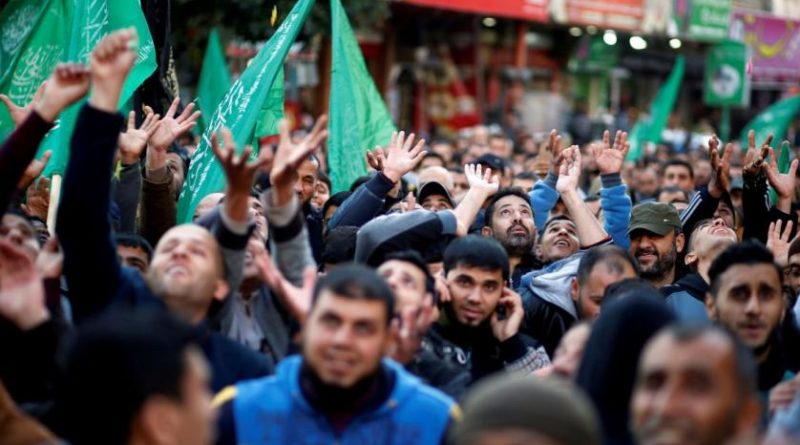OPINION: Why are Palestinians protesting against Hamas?
by Kerry Boyd Anderson
Hamas responded violently, beating, detaining and reportedly torturing activists, journalists and political rivals.
Gaza last week saw significant protests that focused Palestinian criticism on Hamas. Palestinians in Gaza were protesting against hunger and severe, worsening economic and living conditions. As Hamas responded violently, it risked further eroding support for its rule in the Gaza Strip. The more recent violence between Hamas and Israel might partly be an attempt by Hamas to distract from its domestic problems, though it is unclear what effect it may have.
There has been global media attention focused on the Great March of Return, which began on March 30 last year. A group of Palestinian youths and activists — independent of Hamas — began the protests, designed to start by marking the annual Land Day but with the intention of continuing protests beyond that. Every Friday for the last year, the protests have continued. The organizers emphasized nonviolence.
The Great March of Return protests have focused on Israel. They demand an end to the blockade of Gaza and highlight Palestinians’ demand for the right of return for Palestinian refugees to their original communities, many of which are in Israel. Israel’s exceedingly violent response reinforced the protesters’ criticisms. The UN reported in early March that Israeli forces have killed 260 and injured more than 27,000 Palestinians during the protests. A UN investigation released in February found that Israeli forces shot “more than 6,000 unarmed demonstrators” during the protests in 2018.
Hamas has tried to associate itself with the Great March of Return protests and attempted to co-opt them. Its success has been limited, and its attempts to associate with the protests undermined the organizers’ focus on nonviolent protest. Furthermore, reports from Gaza suggest that support for the border area protests is declining, as they do not appear to have achieved anything, while many have died and many more have been seriously injured, putting a severe strain on Gaza’s already overwhelmed medical system.
Then, on March 14, protests began in Gaza that focused anger on Hamas itself. Hamas responded violently, beating, detaining and reportedly torturing activists, journalists and political rivals. The protests revealed frustration and anger with Hamas’ inability to improve the lives of Palestinians, and perceptions of corruption among Hamas officials.
Hamas appears to be trying to distract from the situation by planning other protests, including encouraging turnout for the upcoming one-year anniversary of the Great March of Return, but this could potentially backfire, especially if there is a large number of casualties. Hamas also attempted to blame the Palestinian Authority (PA) for fomenting unrest against it — an obvious attempt to cast blame elsewhere.
The recent protests raise the question of whether Palestinians in Gaza are fed up with Hamas. The answer appears to be that they are fed up with many actors, including Hamas. Gaza is nearly unlivable, with no hope in sight for improvement. Hopelessness is widespread. If a governing organization is supposed to provide basic opportunities and meet the fundamental needs of its people, Hamas has failed. In the last two weeks, it has demonstrated its willingness to use brutal tactics against those who are simply, nonviolently, calling for a chance at life. Polling from the Palestinian Center for Policy and Survey Research (PSR) found a decline in support
for Hamas at around the time of the protests.
However, it is important to recognize that Palestinian anger is also directed at other actors. The PSR survey found that Palestinians in Gaza and the West Bank were most likely to blame Israel (37 percent) for conditions in Gaza, followed by the PA (25 percent), Hamas (21 percent), and Egypt and other actors.
Many Palestinians have expressed exasperation with both Hamas and Fatah for their inability to cooperate. The PA’s use of pressure against Hamas, such as cutting electricity, hurts many Palestinians in Gaza regardless of who they support politically.
As the early days of the Great March of Return showed, Palestinians primarily blame Israel. While Hamas clearly has not demonstrated good governance, it is difficult to imagine that any Palestinian governing body could successfully meet the needs of Palestinians in Gaza while under the type of extreme blockade imposed upon them. Even before the blockade began, Palestinians in Gaza faced little hope for the future, forced into a small walled-in strip of land by the sea. The lack of peace with Israel, which could provide some options for Palestinians in Gaza to live normally, is the foundation of all Gaza’s problems. This has been true for decades, since long before Hamas took control of the Gaza Strip.
Of course, there is plenty of blame to go around. Many Palestinians also blame the US for its support of Israel, and most recently for the Trump administration’s August decision to cut off all US aid to UNRWA, which is especially important to meeting the basic needs of many Palestinians in Gaza. Much of the international community condemns conditions in Gaza but does little to address the underlying causes.
Perhaps much of the blame should go to those who constantly cast blame on others. Hamas blames Israel and the PA, while assuming little responsibility itself. The PA blames Hamas and Israel. Israel and the US blame the Palestinians. On and on, with the Palestinian people caught in the middle. It is difficult to envision a better future for Gaza unless the actors involved start to acknowledge their share of the blame and try to find a solution.
Kerry Boyd Anderson is a writer and political risk consultant with more than 14 years’ experience as a professional analyst of international security issues and Middle East political and business risk. Twitter: @KBAresearch
Disclaimer: Views expressed by writers in this section are their own and do not necessarily reflect Milli Chronicle’s point-of-view



